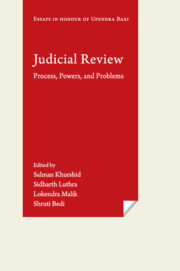Book contents
- Frontmatter
- Contents
- Foreword
- Editors' Note
- Introduction
- 1 The Inadequacy of Judicial Enforcement of Constitutional Rights Provisions to Rectify Economic Inequality, and the Inevitability of the Attempt
- 2 The Interplay of Law and Politics in India
- 3 Beating the Backlog: Reforms in Administration of Justice in India
- 4 Judicial Review: Perspectives and Reflections for the Twenty-First Century
- 5 When ‘Creeping Jurisdiction’ Goes Awry: The Social Action Litigation to Ban Surrogacy
- 6 Judicial Review and the Democratic Judge
- 7 Judicial Review: A Tool to Shape Constitutional Jurisprudence
- 8 The Baxian Bioscope on Indian Judicial Process
- 9 Judicial Activism, Courts, and Constitutional Revolutions: The Israeli Case
- 10 Democracy, Constitution, and Judicial Review: A Critique
- 11 A Minor Jurisprudence of Pathos: Upendra Baxi as Teacher and Writer
- 12 The Need for Reinventing the Supreme Court as a Constitutional Court
- 13 Appointment of ‘Distinguished Jurists’ as Judges in the Supreme Court of India: A Critical Analysis
- 14 Judicial Dissent and Judicial Review: A Functional Analysis
- 15 The Power of Judicial Review: Judicial Chutzpah or Judicial Desideratum
- 16 Judicial Review of Legislations by Tribunals in India: Law, Problems, and Perspectives
- 17 Criminalization of Membership of Terrorist Organizations in India and the United States of America: Human Rights Concerns
- 18 Article 142 of the Indian Constitution: On the Thin Line between Judicial Activism and Restraint
- 19 Sketching the Limits of Article 142 of the Constitution of India: A Constitutional Necessity
- 20 Constitutional Morality and Judges of the Supreme Court
- About the Contributors
- Index
18 - Article 142 of the Indian Constitution: On the Thin Line between Judicial Activism and Restraint
Published online by Cambridge University Press: 23 January 2020
- Frontmatter
- Contents
- Foreword
- Editors' Note
- Introduction
- 1 The Inadequacy of Judicial Enforcement of Constitutional Rights Provisions to Rectify Economic Inequality, and the Inevitability of the Attempt
- 2 The Interplay of Law and Politics in India
- 3 Beating the Backlog: Reforms in Administration of Justice in India
- 4 Judicial Review: Perspectives and Reflections for the Twenty-First Century
- 5 When ‘Creeping Jurisdiction’ Goes Awry: The Social Action Litigation to Ban Surrogacy
- 6 Judicial Review and the Democratic Judge
- 7 Judicial Review: A Tool to Shape Constitutional Jurisprudence
- 8 The Baxian Bioscope on Indian Judicial Process
- 9 Judicial Activism, Courts, and Constitutional Revolutions: The Israeli Case
- 10 Democracy, Constitution, and Judicial Review: A Critique
- 11 A Minor Jurisprudence of Pathos: Upendra Baxi as Teacher and Writer
- 12 The Need for Reinventing the Supreme Court as a Constitutional Court
- 13 Appointment of ‘Distinguished Jurists’ as Judges in the Supreme Court of India: A Critical Analysis
- 14 Judicial Dissent and Judicial Review: A Functional Analysis
- 15 The Power of Judicial Review: Judicial Chutzpah or Judicial Desideratum
- 16 Judicial Review of Legislations by Tribunals in India: Law, Problems, and Perspectives
- 17 Criminalization of Membership of Terrorist Organizations in India and the United States of America: Human Rights Concerns
- 18 Article 142 of the Indian Constitution: On the Thin Line between Judicial Activism and Restraint
- 19 Sketching the Limits of Article 142 of the Constitution of India: A Constitutional Necessity
- 20 Constitutional Morality and Judges of the Supreme Court
- About the Contributors
- Index
Summary
Good men must not obey the laws too well.
–Ralph Waldo EmmersonIntroduction
The emphasis on the above quote of American philosopher Ralph Waldo Emmerson is on the expression ‘too well’. Though made in an entirely different context, the above words of Emmerson, when transposed to the context of judges, can be understood as the judges interpreting and applying the law with less rigidity and harshness when unjust results may arise out of judicial interpretation. Equally significant is a famous Latin maxim fiat justitia ruat caelum meaning let justice be done though the heavens fall. When a judge decides ‘not to obey the laws too well’ it must be to ensure that it is for doing complete justice between the parties and while doing so, nothing should stand in the way of the judge. This understanding that the ultimate objective of judicial power is to ensure complete justice between the parties finds its acceptance in article 142 of the Constitution of India, which states that ‘the Supreme Court in the exercise of its jurisdiction may pass such decree or make such order as is necessary for doing complete justice in any cause or matter pending before it’. This provision is unparalleled and is not found in any major constitutions of the world, from where the Indian Constitution was inspired.
This chapter begins by undertaking a brief survey on the scope of article 142 and its current judicial understanding. In the next part, a comparative approach has been adopted to analyse the application and ambit of ‘complete justice’ under the Constitutions of Pakistan, Nepal, and Bangladesh, which contain similar provisions as article 142. The subsequent part of the chapter attempts to answer the issue of whether in guise of ‘complete justice’ under article 142, the judiciary can transgress into the powers of the legislature and the executive. In other words, does article 142 permit judicial legislation? The chapter concludes by answering some of the recent controversies surrounding article 142 and offering suggestions for better use of the powers under article 142.
Article 142: Origins and Constituent Assembly Debates
Article 142(1) had no counterpart in the Government of India Act, 1935, whose provisions had been heavily incorporated into the Indian Constitution. Article 118 of the Draft Constitution, which eventually became article 142 of the present Constitution, was adopted without any debate in the Constituent Assembly.
- Type
- Chapter
- Information
- Judicial Review , pp. 341 - 364Publisher: Cambridge University PressPrint publication year: 2020

